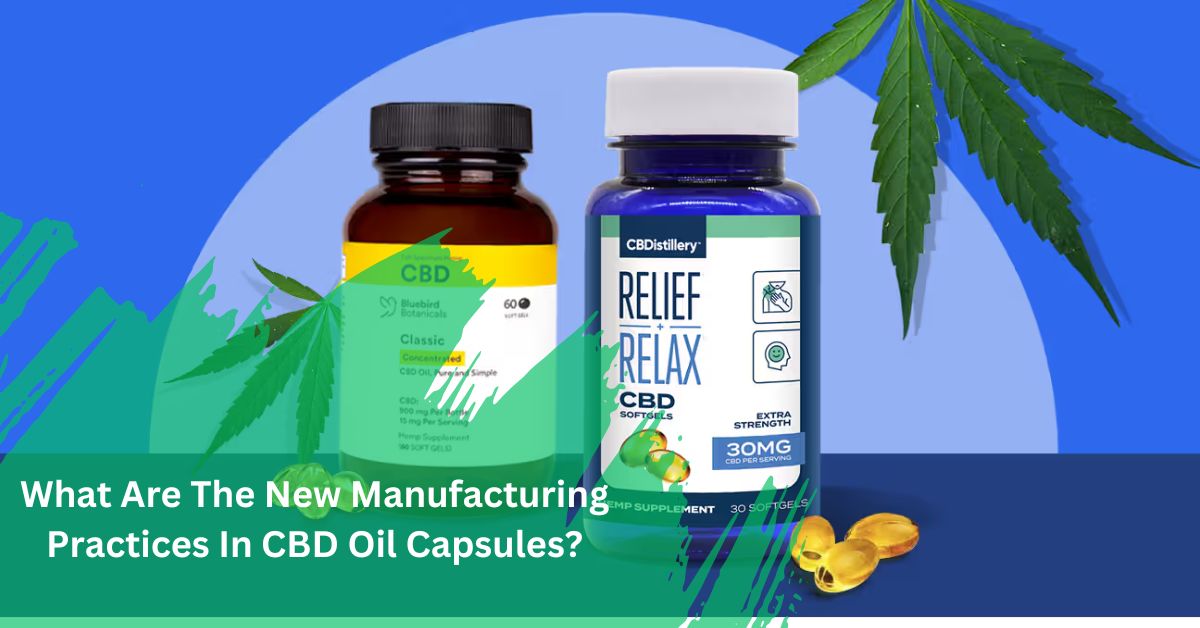What Are The New Manufacturing Practices In CBD Oil Capsules?
The CBD industry has seen remarkable growth in recent years, with consumers increasingly turning to CBD oil capsules for their convenience and effectiveness.
As the demand for these products continues to rise, manufacturers are continuously innovating and refining their manufacturing practices to meet consumers’ evolving needs and expectations.
This blog post will explore the latest manufacturing practices in these oil capsules, highlighting the advancements and technologies shaping the production process.
From innovative extraction methods to sustainable packaging solutions, manufacturers are implementing new strategies to ensure these oil capsules’ quality, safety, and sustainability.
Join us as we delve into the exciting world of CBD manufacturing and uncover the new practices driving the industry forward.

7 New Manufacturing Practices In CBD Oil Capsules
Nanoemulsion technology
A new manufacturing practice in CBD oil capsules is using nanoemulsion technology. This innovative method involves breaking oil particles into nanoscale droplets, significantly reducing their size. By doing so, the molecules become more bioavailable and easily absorbed by the body, enhancing the effectiveness of the capsules.
Nanoemulsion technology allows for better dispersion of the oil in water-based solutions, resulting in improved stability and shelf-life of the capsules. CBD manufacturers are increasingly adopting this manufacturing practice to provide consumers with products with enhanced potency and faster onset of effects.
Liposomal encapsulation
A new manufacturing practice in CBD oil capsules is liposomal encapsulation. This advanced technique involves encapsulating the molecules within lipid-based vesicles known as liposomes. These liposomes act as protective carriers, shielding the CBD from degradation and improving its absorption in the body.
Liposomal encapsulation enhances the bioavailability of the oil, allowing for more efficient delivery to targeted cells and tissues. Manufacturers can offer products with increased potency and effectiveness by incorporating liposomal technology into the oil capsules. This manufacturing practice is gaining traction in the industry as a way to optimize the therapeutic potential of CBD capsules for consumers.

CO2 extraction methods
A new manufacturing practice in CBD oil capsules is using CO2 extraction methods. This cutting-edge technique involves using carbon dioxide (CO2) as a solvent to extract Cannabidiol from the hemp plant. CO2 extraction is considered one of the most efficient and environmentally friendly methods for obtaining high-quality oil.
It allows manufacturers to carefully control temperature and pressure to extract cannabinoids, terpenes, and other beneficial compounds from the plant material while leaving behind any unwanted residues or contaminants.
CO2 extraction results in a pure and potent CBD oil that can formulate capsules with consistent dosages and reliable effects. This manufacturing practice is increasingly favored by the companies seeking to produce premium-quality capsules that meet stringent standards.
Full-spectrum extraction
A new manufacturing practice in CBD oil capsules is the adoption of full-spectrum extraction. This method extracts Cannabidiol and all other naturally occurring cannabinoids, terpenes, and flavonoids from the hemp plant. Unlike the isolate, which contains only pure Cannabidiol, full-spectrum CBD oil capsules retain the full range of compounds in the hemp plant.
This approach is believed to enhance the overall effects of CBD by leveraging the synergistic interactions between cannabinoids and other plant compounds, known as the “entourage effect.” Full-spectrum extraction allows manufacturers to create capsules that offer a comprehensive and holistic experience, potentially providing consumers with greater relief and wellness benefits. As a result, full-spectrum oil capsules have become increasingly popular among those seeking a more robust and natural approach to these supplements.
Water-soluble formulations
A new manufacturing practice in CBD oil capsules is the development of water-soluble formulations. Traditionally, the oil is hydrophobic, meaning it does not dissolve easily in water. However, with technological advancements, manufacturers have devised methods to create water-soluble formulations.
These formulations use specialized techniques to break down the molecules into smaller particles, allowing them to disperse evenly in water-based solutions. Water-soluble CBD oil capsules offer several advantages, including improved bioavailability and faster onset of effects than traditional oil-based capsules.
Additionally, they provide consumers with greater flexibility in consumption, as they can be easily added to beverages or consumed directly for quick and convenient dosing. This new manufacturing practice represents a significant innovation in the industry, offering consumers more effective and versatile options for incorporating CBD into their daily routines.
Sustainable packaging materials
A new manufacturing practice in CBD oil capsules is using sustainable packaging materials. As environmental awareness grows, the manufacturers increasingly prioritize sustainability in their production processes.
This includes sourcing packaging materials that are biodegradable, recyclable, or made from renewable resources. Sustainable packaging helps reduce the environmental impact of the oil capsules by minimizing waste and carbon emissions throughout the product life cycle. Additionally, it appeals to eco-conscious consumers concerned about the environmental footprint of the products they purchase.
By adopting sustainable packaging practices, CBD manufacturers are meeting consumer demand for environmentally friendly products and contributing to the overall reduction of plastic pollution and resource depletion. This new manufacturing practice reflects a commitment to environmental stewardship and responsible business practices within the industry.
Quality assurance through third-party testing
A new manufacturing practice in CBD oil capsules is the implementation of quality assurance through third-party testing. With the increasing demand for transparency and reliability in the industry, many manufacturers are subjecting their products to rigorous third-party testing protocols.
These tests are conducted by independent laboratories specializing in analyzing CBD products for potency, purity, and safety. By outsourcing testing to third-party laboratories, manufacturers can ensure that their oil capsules meet high-quality standards and comply with regulatory requirements.
Third-party testing gives consumers confidence in the quality and authenticity of the products they are purchasing, as it verifies the accuracy of label claims and ensures that capsules are free from contaminants such as pesticides, heavy metals, and microbial pathogens.
This new manufacturing practice demonstrates a commitment to product integrity and consumer trust within the CBD industry.

Summing It Up
The evolving landscape of the CBD industry has ushered in a wave of new manufacturing practices for these oil capsules. From innovative extraction methods to sustainable packaging materials and quality assurance through third-party testing, manufacturers continuously strive to improve their products’ quality, efficacy, and sustainability. These advancements ensure the safety and reliability of oil capsules and enhance the overall consumer experience. By embracing new technologies and best practices, the manufacturers are meeting the demands of a growing market while contributing to the advancement of the industry.




